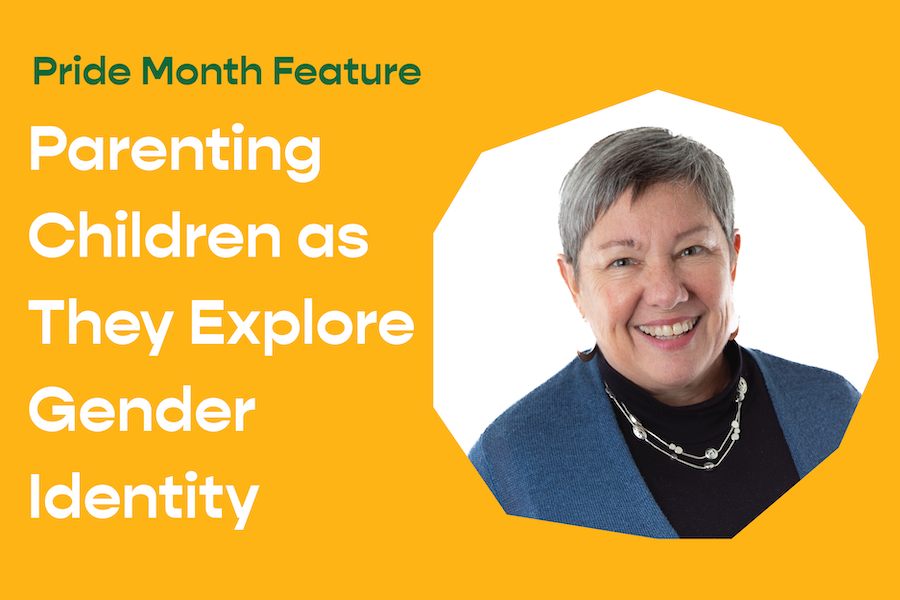By Kate Blaker, MAT, NBCC, LPC
June 1, 2023
Parents have a unique influence on their children’s lives, particularly when it comes to matters of identity and self-acceptance. Between the ages of about two and four years of age children pay particular attention to the exploration of their gender identity.
Children pay close attention to the behaviors of the people around them. They also pay attention to the expectations of others, particularly their parents, and begin to practice “trying on” different identities.

Gender Identity Terms
What does cisgender mean and why are gender identity terms important? Using accurate and inclusive language helps to foster an environment of acceptance, respect, and support. The Annie E. Casey Foundation defines common sexual and gender identity terms here.
Through play, children experiment with different roles: firefighter, superhero, mom.
As the child tries out different roles, feelings of acceptance as well as rejection come from their parents, their extended family, and their community.
Cisgender parents often attempt to influence their child’s gender identity, unconsciously and intentionally.
As an ally and advocate of transgender individuals and their families, I believe that parents hold a crucial role in supporting their children’s healthy understanding of identity and fostering acceptance of themselves.
Some children notice that their understanding of their identity does not match their assigned sex at birth. This is a profoundly transformative moment within a family. Cisgender parents will likely experience a wide range of emotions in response to their child’s declaration of identity. They may feel concern for a child who is not in the cultural mainstream. Parents may wonder if this is a temporary experience for their child. Cultural influences will possibly affect the feelings parents will experience.
It is important to recognize that the feeling of grief can also be an important part of this journey. Parents may need to mourn the loss of the child they once knew in order to embrace and love their child unconditionally as they are now. Grief can often be complicated by a parent’s feelings of shame for feeling sorrow when they only want to be supportive of their child. Parents may fear that their grief is misunderstood for being a rejection of their child’s identity.
As a therapist working with families, my primary focus is on facilitating connection within the family unit. However, before establishing those connections, each family member must identify and communicate their expectations regarding the gender identification process. By providing a safe and supportive space, therapists help parents and children explore their thoughts, feelings, and concerns, fostering open and honest communication. This is especially true for the feelings of grief that often occur for parents who care about their child, and want to honor their child’s identity, but are grieving the loss of their child that was.
Once expectations are identified, it is essential to encourage family members to engage in self-reflection and learning. Together, we seek to reframe any previous thought patterns that may be rooted in biases or misconceptions. By examining these beliefs, parents and children can replace them with healthier and more inclusive perspectives. This process of unlearning and growth enables families to develop new patterns that promote connection, understanding, and empathy.
Education plays a vital role in supporting parents and children on their journey of acceptance and understanding. Providing access to educational resources, such as books, articles, or workshops, empowers parents to expand their knowledge about gender diversity, identity exploration, and the experiences of their child. These resources not only promote understanding but also facilitate meaningful conversations within the family, encouraging empathy and fostering a supportive environment.
As parents navigate the tender spaces of their child’s identity exploration, it is crucial to approach the journey with empathy, openness, and a willingness to learn. Recognizing and processing feelings of grief allows parents to fully embrace their child’s authentic self. By fostering honest communication, identifying expectations, and reframing thought patterns, families can build stronger connections and promote a supportive environment where every individual’s identity is celebrated.

Remember, as parents, you have the power to create a loving and accepting space that empowers your child to thrive and embrace their true identity. Together, we can create a future where all individuals, regardless of their gender or identity, are embraced and celebrated for who they are.
Understanding, accepting, and supporting your child through these changes can be difficult. Josselyn has many therapists, like Kate, trained to support children, parents and families through this process. Get started here or call 847-441-5600.




